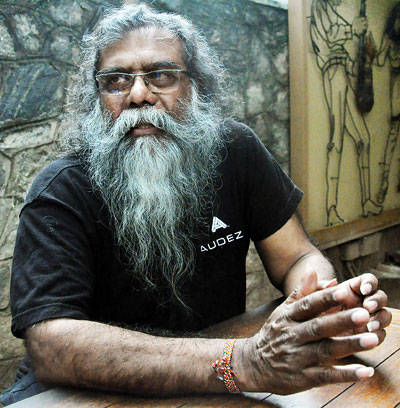Preserving musical traditions
It’s not often that one gets to meet a Sri Lankan, who has engineered and produced multiple Grammy Award winning recordings. The mere thought of winning a Grammy is an exciting one but actually doing it is a different story that involves pure dedication. We meet audio engineer and record producer Kavichandran Alexander, a Sri Lankan who achieved this feat, at the Sooriya Village, earlier this week. Kavichandran was born in Batticaloa in 1949. He grew up in Hatton, before moving to Ratmalana, where he was at the boarding at St Thomas’ College until he quit his formal education.

Kavichandran. Pic by Ranjith Perera
Back in school, he was the pioneer of the Radio Club at school and the Rocket Club. “I became very notorious, causing havoc,” he tells us, with a mischievous grin.
Kavichandran’s first involvement with music, dates back to his boarding days. At the time, all Christian students had to get up an hour early for church. But all the non-Christians got to sleep for an extra hour and a half. “This was a lot of sleep and I decided that this was not good, I had to get out of this!” As it turned out, the school had a blind organist, who used to get off the bus at Galle Road and walk to the chapel. Sooner Kavichandran managed to set himself the task of leading the man to the organ, located on the chapel balcony each morning. And while the man would play, Kavichandran would go to sleep on a bench, because no one could see him up there.
“In fact I’ve asked the warden of the school to let me do a recording, so that I could atone for my sins,” he says. He was first exposed to religious music. “My mother played Carnatic violin and sang in the church.” It was at this point he, fell in love with music and because his love for music, poetry and a desire to lead a spiritual life came from his mother, he named his recording company ‘Water Lily Acoustics’, after her.
“She would always tell me that it’s not about making money. But she wanted me to see God. I feel that this was a blessing, and you couldn’t ask for a better gift from your mother.”
A young Kavichandran at 18 quit school and moved to Paris, France. Here he managed to secure a job in ‘Hair’, a rock musical. He used the money he made, to buy records, books. As he started to read more, Kavichandran discovered a wealth of art and culture. A friend soon introduced him to Jazz and Classical music, some of which included the likes of Hindustani classics such as Ali Akbar Khan.
Sooner, he developed a love for Indian, Persian, Chinese and Arab classical music. Whilst listening to these records, however Kavichandran found that the quality of recording of all the Eastern masters was quite poor. This led to his desire to own good stereos and amplifiers to get more filters etc.
That was when he realised what he wanted to do in life – to start a record label to record the music he loved, properly. The recording company he built is based on preserving musical traditions of primarily the Asian culture and also the Western Culture.
We talk more about his studio, to which he explains that he sees himself as a local village farmer who uses organic products. “I don’t make hits. I don’t record music that can be con- sidered a hit,” he tells us adding that no matter how much money it would bring, he never recorded music which he didn’t love.
The kind of recording which he does required good acoustics and Kavichandran has always stuck to “simple microphone techniques, high quality gear and short signal paths.”
Our conversation moves onto “A Meeting By The River” which was an album he co-produced, that went on to win the Grammy Award for Best World Music Album in 1993. This was a collaboration with Ry Cooder and Vishwa Mohan Bhatt, “that happened quite by chance,” he tells us.
Kavichandran had the idea to combine different musicians from different cultures. It so happened that at the time he got the chance to record Vishwa playing Hindustani Classical music. “A friend of mine, who heard this record, said “I’ve got to get this to Ry Cooder’ and I said yes do it. When he heard it, Ry Cooder thought it was fantastic. So he drives out to Santa Barbara and meets Vishwa in the lobby of a hotel, they wisp off to a catholic church and three hours later the record was born,” he relates adding that it was unplanned and unrehearsed.” With a wealth of knowledge and experience behind him Kavichandran concludes our chat with a message of “Compassion.” You cannot go through life without it. It’s the only key with anything you do whether it’s with music or something else. “I’ve been blessed with recording some truly great musicians both East and West. This is how it’s been my whole life, people coming in and enriching it, almost by chance. I am who I am today because of the love and generosity of wonderful people.”
| The Sooriya Village will be hosting a series of workshops with Kavichandran this week from 6.30pm to 9.30pm and tickets are priced Rs. 1,500 per day. The dates are as follows. ‘Approaches to pairing musicians from varied traditions’ – Monday March 26. ‘Approaches to selecting varied acoustical environments’ -Tuesday March 27. ‘Microphone positioning techniques’ – Thursday March 29. ‘Recording techniques and playback – March 30). To register email contact@thesooriyavillage.lk | |


